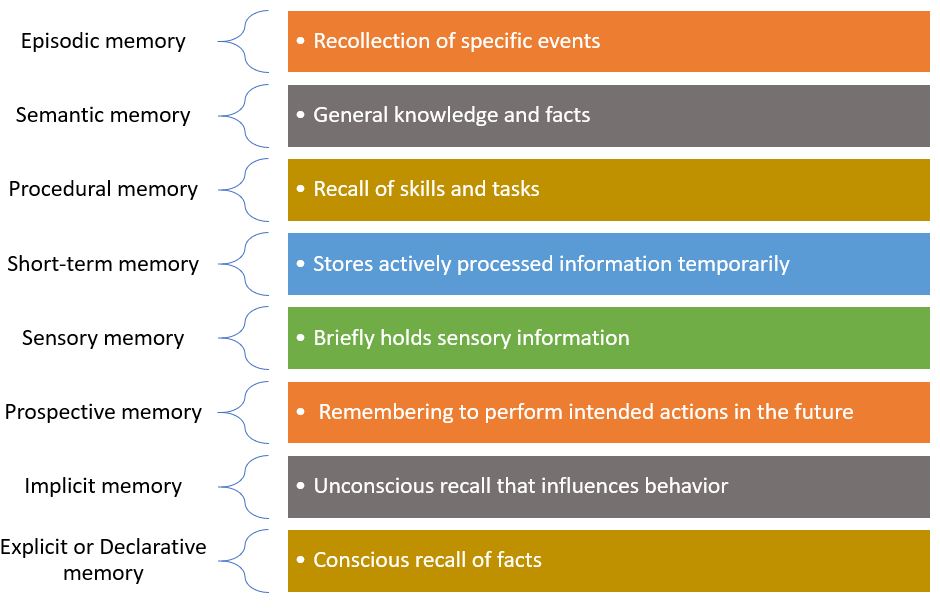Types of Memory in Psychology
Memory encompasses a diverse range of functions, each serving its purpose in encoding, storing, and retrieving information.

The different types of memory are discussed below.
1. Episodic Memory
When a person recalls a particular event (or “episode”) experienced in the past, that is episodic memory.
The examples of Episodic Memory are as follows:
- Your first day of school
- Your last birthday celebration
- A family vacation to the beach
- Attending a friend’s wedding
- Graduating from high school
2. Semantic Memory
Semantic memory is someone’s long-term store of knowledge. It is composed of pieces of information such as facts learned in school, what concepts mean and how they are related, or the definition of a particular word.
The examples of Semantic Memory are as follows:
- Knowing that Paris is the capital of France
- Understanding that water is composed of hydrogen and oxygen
- Recalling that a triangle has three sides
- Remembering that the colour red signifies danger
- Knowing that the Earth orbits around the sun
3. Procedural Memory
The term describes long-term memory for how to do things, both physical and mental, and is involved in the process of learning skills—from the basic ones people take for granted to those that require considerable practice.
The examples of Procedural Memory are as follows:
- Riding a bicycle
- Typing on a keyboard
- Tying shoelaces
- Playing a musical instrument
- Swimming
4. Short-term Memory and Working Memory
The terms short-term memory and working memory are sometimes used interchangeably, and both refer to storage of information for a brief amount of time.
While short-term memory involves the temporary storage of information for immediate use, typically holding a limited amount of information for a short duration, working memory encompasses not only the temporary storage of information but also the active manipulation and processing of that information to facilitate cognitive tasks such as problem-solving and comprehension. Additionally, working memory includes executive control processes like attention and decision-making, making it more dynamic and essential for higher-order cognitive functions compared to the more passive nature of short-term memory.
For example, Short-term memory (STM) comes into play when you read the first step of the instructions and briefly hold that information in your mind while you perform the action. For example, you read “Attach piece A to piece B with screws.” You temporarily remember this instruction in your short-term memory while you physically attach the pieces.
Working memory, on the other hand, goes beyond mere storage of the instruction. It involves actively manipulating and using the information. So, as you attach piece A to piece B, your working memory is engaged in holding onto the previous step (“Attach piece A to piece B”) while also integrating it with the next step (“Attach piece C to piece D”). Additionally, working memory enables you to mentally visualize the process, anticipate upcoming steps, and make decisions about how to proceed, such as determining which screws to use or which side of the pieces to align.
The examples of Short-term Memory are as follows:
- Remembering a phone number just long enough to dial it.
- Recalling a shopping list while walking through the grocery store.
- Retaining a password while logging into an account.
- Holding a conversation and remembering the topic discussed a few minutes ago.
- Recalling the directions to a nearby location while driving.
The examples of Working Memory are as follows:
- Following instructions while assembling furniture.
- Mentally calculating a tip while paying for a meal at a restaurant.
- Solving a math problem by holding intermediate steps in mind.
- Reading a passage and summarizing the main points without referring back to the text.
- Listening to a lecture and taking notes simultaneously.
5. Sensory Memory
Sensory memories are what psychologists call the short-term memories of just-experienced sensory stimuli such as sights and sounds. The brief memory of something just seen has been called iconic memory, while the sound-based equivalent is called echoic memory. Additional forms of short-term sensory memory are thought to exist for the other senses as well.
Sense-related memories can also be preserved long-term. Visual-spatial memory refers to memory of how objects are organized in space—tapped when a person remembers which way to walk to get to the grocery store. Auditory memory, olfactory memory, and haptic memory are terms for stored sensory impressions of sounds, smells, and skin sensations, respectively.
The examples of Sensory Memory are as follows:
- Briefly remembering the sight of a passing car
- Recalling the sound of a door slamming shut
- Remembering the smell of freshly baked bread
- Feeling the sensation of warm sunlight on your skin
- Recollecting the taste of a delicious meal
6. Prospective Memory
Prospective memory is forward-thinking memory. It means recalling an intention from the past in order to do something in the future. It is essential for daily functioning, in that memories of previous intentions, including very recent ones, ensure that people execute their plans and meet their obligations when the intended behaviors can’t be carried out right away, or have to be carried out routinely.
The examples of Prospective Memory are as follows:
- Remembering to attend a scheduled meeting later in the day
- Recalling to take medication at a specific time
- Remembering to buy groceries on the way home from work
- Recollecting to wish a friend a happy birthday on the appropriate day
- Remembering to pay bills before they are due
7. Implicit and Explicit memory
Implicit and Explicit are both types of long-term memory. The information we store or remember unconsciously is called implicit memory, while the information we memorize consciously is known as explicit memory.
The examples of Implicit are as follows:
- Riding a bicycle without consciously recalling how
- Reacting with fear to a traumatic event without consciously recalling the details
The examples of Explicit Memory are as follows:
- Recalling the names of the U.S. presidents
- Remembering your childhood address
- Recalling the plot of a book you read last month
8. Long-term Memory
Long-term memory is a type of memory that persists over time, ranging from minutes to years. It refers to the storage of information for an extended period, potentially indefinitely.
In addition to above categorization, the Memory can be classified in terms of Long-term Memory as: (i) declarative or explicit memory and (ii) non-declarative or implicit memory, which are explained below.
I. Declarative memory or Explicit memory
When we assess memory by asking a person to consciously remember things, we are measuring explicit memory. Explicit memory refers to knowledge or experiences that can be consciously remembered.
There are 2 types of explicit memory: episodic and semantic.
1. Episodic memory refers to the firsthand experiences that we have had (e.g., recollections of our high school graduation day or of the fantastic dinner we had in New York last year).
2. Semantic memory refers to our knowledge of facts and concepts about the world (e.g., that the absolute value of −90 is greater than the absolute value of 9 and that one definition of the word “affect” is “the experience of feeling or emotion”).
II. Implicit memory
Implicit memory refers to the influence of experience on behaviour, even if the individual is not aware of those influences. There are 3 general types of implicit memory: procedural memory, classical conditioning effects, and priming.
1. Procedural memory involves our subconscious knowledge of how to perform tasks. Examples include walking, speaking a language, operating a phone, or playing a video game. While we may not be able to articulate these processes, procedural memory enables us to execute complex actions effortlessly. This concept sheds light on how infants acquire fundamental skills like crawling and talking, which are ingrained during childhood without conscious recollection in adulthood.
2. Classical conditioning effects entail the unconscious association of neutral stimuli with other stimuli, leading to natural responses such as pleasure or salivation. Through this form of learning, a conditioned stimulus, like a sound, elicits a response similar to the unconditioned stimulus, such as food, after the association is formed.
3. Priming, the third type of implicit memory, involves changes in behavior due to frequent or recent experiences. It encompasses both the activation of knowledge (e.g., presenting words related to kindness to prime the concept) and the subsequent impact of this activation on behavior (e.g., individuals primed with kindness may exhibit more compassionate actions).
UGC NET Previous Year Questions (Types of Memory)
1.) The memory for general knowledge and facts about the world, as well as memory for the rules of logic that are used to deduce other facts, is known as ______. (UGC NET 6th December 2023 Evening Paper)
(A) Temporary memory
(B) Semantic memory
(C) Iconic memory
(D) General memory
ANS. B
2.) Given below are two statements: (UGC NET 8th December 2023 Evening Paper)
Statement I: Implicit memory refers to intentional or conscious recollection of information.
Statement II: Explicit memory refers to memories people are not consciously aware of, but that can affect their subsequent performance and behavior.
In light of the above statements, choose the most appropriate answer from the options given below.
(A) Both statement I and Statement II are correct
(B) Both statement I and Statement II are incorrect
(C) statement 1 is correct but statement II is incorrect
(D) statement 1 incorrect but statement II is correct
ANS. B
3.) Which of the following are the types/sub-types of long-term memory? (UGC NET 8th December 2023 Morning Paper)
A. Declarative memory
B. Procedural memory
C. Episodic memory
D. Semantic memory
Choose the correct answer from the options given below:
(A) A, C and D only
(B) B and C only
(C) A and D only
(D) A, B, C and D
ANS. D
4.) Which of the following are the types of Implicit memory? (UGC NET 15th June 2023 Paper)
A. Semantic memory
B. Procedural memory
C. Priming
D. Episode memory
E. Classical conditioning effects
Choose the correct option from the options given below:
(A) A & C only
(B) C, D & E only
(C) B, C, & E only
(D) A & B only
ANS. C
5.) The brain system that provides temporary holding and processing of information to accomplish complex cognitive tasks such as language comprehension, learning and reasoning the information that you are focusing on at a given moment is concerned with (UGC NET 20th June Morning 2023 Paper)
(A) Episodic memory
(B) Working memory
(C) Semantic memory
(D) Short-term memory
ANS. B



